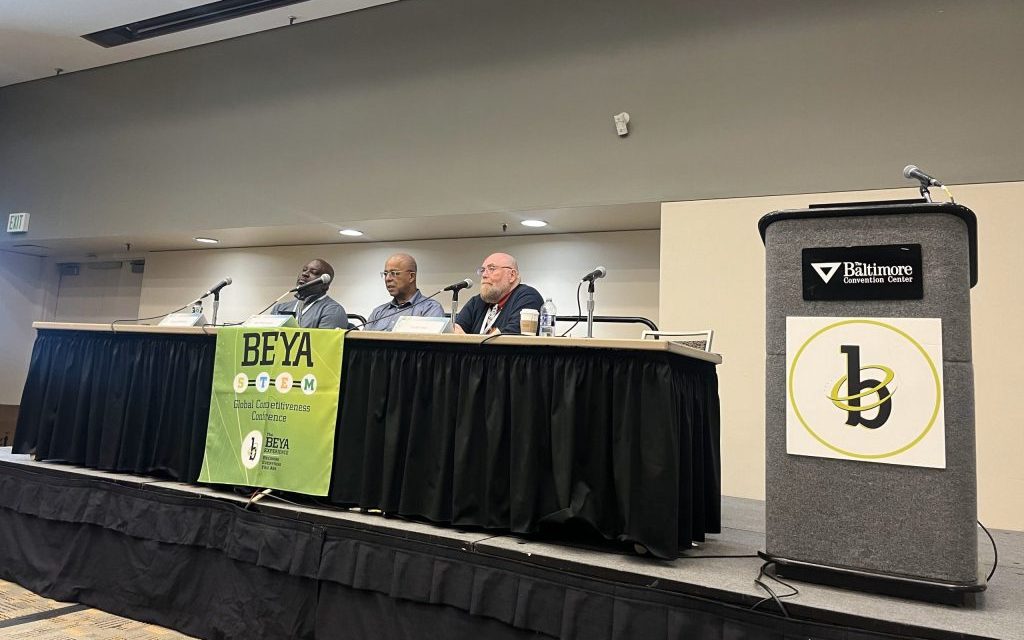By Megan Sayles
AFRO Staff Writer
msayles@afro.com
With the U.S. undergoing a crisis in its healthcare system, from racial disparities to high costs, biotechnology has emerged as an area of opportunity. With the help of artificial intelligence (AI), biotechnology enables providers to make treatments more precise, personalized and, at times, more effective.
Technology experts led a panel at the 2025 BEYA STEM Conference on Feb. 14 to examine how biotechnology innovations are shaping the present and future of healthcare.
“We’re at a time that’s pretty special in the history of technology,” said Ken Washington, chief technology and innovation officer at Medtronic. “I’ve been in and around technology my whole career, and I have never seen a time when the pace of innovation is moving at the speed that it is today.”
Biotechnology innovations in clinical settings
At Medtronic, Washington helps to lead the design and development of medical devices and therapies that leverage technology, data science, AI and automation. He said the company’s approach is “innovating for insights.” Not only does it bring technology to clinical settings, it seeks to empower physicians and health care workers with these technologies to become better providers.

“At the end of the day, all of these technologies, innovations and capabilities lead to a deeper understanding of what the patient’s needs are,” said Washington. “We’re not innovating for innovation’s sake. We are innovating because it will lead to better patient outcomes. Better patient outcomes require clinicians to understand specifics about a single patient, and that’s what some of these technologies are aiming to do.”
One technology Medtronic has innovated is called the “GI Genius.” The product, designed for gastroenterologists, streamlines colonoscopies. It is an AI model that has been trained on millions of previously performed colonoscopies and enables gastroenterologists to improve their detection of polyps in real time.
On average, one out of four, or 25 percent of, polyps are missed, according to Washington. The GI Genius has the power to eliminate or reduce this miss rate.
Another Medtronic innovation is the LINQ II, an insertable cardiac monitor with AI algorithms for long-term heart management. The monitor tracks a person’s heartbeat and detects if they are having an episode of atrial fibrillation, a disorder where the heart beats irregularly and rapidly.
Because the device is embedded in the chest, the signal it obtains can be noisy, resulting in false positives at times. The LINQ II’s AI algorithms enable it to remove 98 percent of these false detections.
Anytime Medtronic uses AI in new technologies, Washington said the development process is guided by principles that include safety, effectiveness, fairness, non-discrimination, quality, accountability, privacy, transparency and human control and oversight.
“These are not tools that we’re designing to replace trained, skilled physicians. These are tools we’re using and developing for trained, skilled physicians to provide their human control, in addition to AI, to become even better and more skilled.”
Addressing the challenges and limitations of AI use in biotechnology
One common obstacle to AI-powered technologies is reluctance in adoption. Todd Frech, a health care information technology (IT) specialist, explained that resistance to emerging technology is nothing new. He led the development of the second-available electronic health record decades ago and said doctors met it with disinterest.
“Technology has a place, and the viability is there, but how do we get the providers to adopt it?” said Frech. “That’s going to be the job of the young engineers who come after us.”
Another issue for AI is bias. AI models learn from large datasets to recognize patterns and make more accurate predictions. But, if the data it’s trained on is not diverse enough or reflects historical prejudices, then the technology may replicate or perpetuate biases.
Frech said it’s crucial for AI models to have the requisite data to understand the differences in patients and in the way care should be delivered.
“There’s a lot of difference in the way you see disease presented in patients and the way we see disease presented in certain races of people,” said Frech. “We need to make sure the models we use to do this training represent all of the people that we could potentially see.”
The post BEYA STEM Conference examines biotechnology’s potential to transform healthcare appeared first on AFRO American Newspapers.










